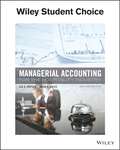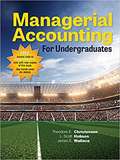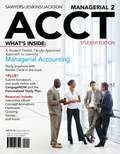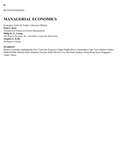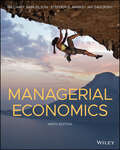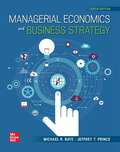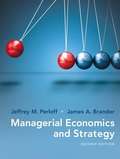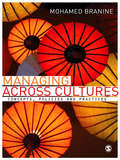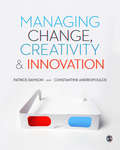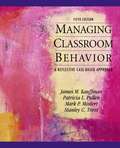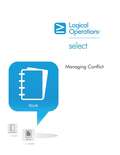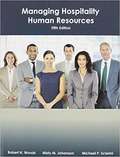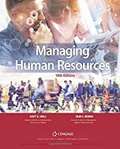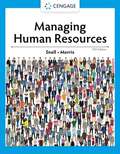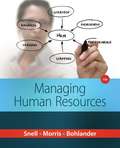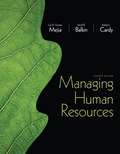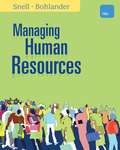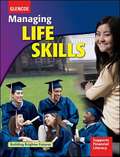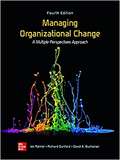- Table View
- List View
Managerial Accounting for Managers
by Eric Noreen Peter Brewer Ray GarrisonAuthors Eric Noreen, Peter Brewer, and Ray Garrison have crafted a streamlined Managerial Accounting book that is perfect for non-accounting majors who intend to move into managerial positions by focusing on the fundamentals to develop the conceptual framework managers need to succeed.
Managerial Accounting for the Hospitality Industry
by Lea R. Dopson David K. HayesFollowing a successful debut edition, this new Second Edition of Managerial Accounting for the Hospitality Industry builds on its strengths of clear organization and the ease with which students work through it. This new edition includes more basic math support for students and a more developed inclusion of ethical considerations and global changes both in accounting systems and in the hospitality industry.
Managerial Accounting for Undergraduates
by Theodore Christensen Scott Hobson James WallaceMany undergraduate managerial accounting textbooks focus primarily on calculations and formulas and how to apply these accounting skills in a manufacturing environment. However, business professionals must be able to apply their technical accounting knowledge and expertise in a broader context in making good business decisions. Moreover, because the U.S. market is increasingly service oriented, professionals must develop experience in applying these skills to decision making in a service environment. Having spent several years supplementing existing textbook problems with more real-world and service industry examples, we saw a need for a new approach. Hence, we focus on helping students to (1) develop strong analytical skills and (2) apply them in realistic decision-making contexts. Finally, we have written the book with a heavy emphasis on managerial decisions in service and merchandising enterprises. Managerial Accounting for Undergraduates is intended for use in the first managerial accounting course at the undergraduate level-one that balances the development of management accounting tools with their implementation in decision making. This book teaches future business professionals how to read, analyze, and interpret accounting and other company, industry, and economic data to make informed business decisions.
Managerial Accounting for Undergraduates
by Theodore Christensen Scott Hobson James WallaceManagerial Accounting for Undergraduates is intended for use in the first managerial accounting course at the undergraduate level—one that balances the development of management accounting tools with their implementation in decision making.
Managerial Accounting, Seventh Edition
by Al L. Hartgraves Wayne J. MorseThe seventh edition presents managerial accounting in the context of a big-picture, decision oriented, business setting. It integrates traditional coverage with contemporary topics to engage students to read further and understand the materials presented. The book provides a framework for identifying and analyzing decision alternatives and for evaluating success or failure in accomplishing such organizational goals.
Managerial ACCT2
by Roby Sawyers Steve Jackson Greg JenkinsDesigned for and by today's students in every detail, Financial ACCT2 was developed from nearly 300 students and 100 faculty members to provide a more engaging and accessible solution that appeals to different learning styles at a value-based price. ACCT2 includes all of the key concepts that your instructors require and a full suite of learning aids to accommodate your busy lifestyle including chapter-by-chapter study cards, self-quizzes, downloadable flash cards, animations, and more. ACCT2 employs an engaging narrative that emphasizes strong and effective examples to convey and reinforce fundamental financial accounting concepts and procedures. In an attempt to avoid excessive detail, the book focuses on the core concepts that students need to learn in the course through the use of streamlined chapter objectives, shorter chapters, clarity of examples, and a visually engaging design. Included with each new copy of the text is access to Cengage NOW, where many of these rich media assets are housed and you have a multitude of opportunities to practice accounting.
Managerial Economics
by Paul Keat Philip Young Steve ErfleDirected primarily toward undergraduate/MBA students in Economics, this text also provides practical content to current and aspiring industry professionals. <p><p> This text will excite readers by providing a more linear progression, while proving the consistency and relevance of microeconomic theory. <p><p>The Seventh Edition welcomes a new co-author, Stephen Erfle of Dickinson College, who has contributed many revisions and improvements to the quantitative sections of the text, as well as provided a major addition: the use of Excel in the presentation of many of the numerical and graphical illustrations presented throughout the text.
Managerial Economics
by William F. Samuelson Stephen G. Marks Jay L. ZagorskyManagerial Economics, 9th Edition, introduces undergraduates, MBAs, and executives to the complex decision problems today’s managers face, providing the knowledge and analytical skills required to make informed decisions and prosper in the modern business environment. Going beyond the traditional academic approach to teaching economic analysis, this comprehensive textbook describes how practicing managers use various economic methods in the real world. Each in-depth chapter opens with a central managerial problem--challenging readers to consider and evaluate possible choices--and concludes by reviewing and analyzing the decision through the lens of the concepts introduced in the chapter. <p><p> Extensively updated throughout, the text makes use of numerous extended decision-making examples to discuss the foundational principles of managerial economics, illustrate key concepts, and strengthen students' critical thinking skills. A range of problems, building upon material covered in previous chapters, are applied to increasingly challenging applications as students advance through the text. Favoring practical skills development over complicated theoretical discussion, the book includes numerous mini-problems that reinforce students' quantitative understanding without overwhelming them with an excessive amount of mathematics.
Managerial Economics and Business Strategy
by Michael R. Baye Jeff PrinceManagerial Economics and Business Strategy has been revised to include updated examples and problems, but it retains all of the basic content that made previous editions a success. By teaching managers the practical utility of basic economic tools such as present value analysis, supply and demand, regression, indifference curves, isoquants, production, costs, and the basic models of perfect competition, monopoly, and monopolistic competition. <p><P> This 10th edition retails the emphasis on real-world examples and modern topics along with unique coverage found nowhere else: oligopoly, penetration pricing, multistage and repeated games, foreclosure, contracting, vertical and horizontal integration, networks, bargaining, predatory pricing, principal agent problems, raising rival’s costs, adverse selection, auctions, screening and signaling, search, limit pricing, and a host of other pricing strategies for firms enjoying market power. This balanced coverage of traditional and modern microeconomic tools makes it appropriate for a wide variety of managerial economics classrooms.
Managerial Economics And Strategy
by Jeffrey M. Perloff James A. BranderThe Second Edition has been fully revised and updated to reflect new supply-and-demand curves and include discussions of corporate social responsibility, opportunistic behavior, and innovation. It also features new learning objectives, examples, end-of-chapter questions, and spreadsheet exercises.
Managerial Economics (Third Edition)
by Luke M. Froeb Brian T. Mccann Mikhael Shor Michael R. WardTeach your MBA students how to use economics to solve business problems with this breakthrough text. MANAGERIAL ECONOMICS: A PROBLEM SOLVING APPROACH, 3E covers traditional material using a problem-based pedagogy built around common business mistakes. Models are used sparingly, and then only to the extent that they help students figure out why mistakes are made, and how to fix them. This edition's succinct, fast-paced presentation and challenging, interactive applications place students in the role of a decision maker who has to not only identify profitable decisions, but also implement them. The lively book provides an excellent ongoing reference for students pursuing business careers. Instructor's remark, "The Froeb/McCann/Shor/Ward textbook is designed for decision makers. Each chapter provides logical steps to solve common but misunderstood business problems. The books candor and novelty make for easy, enjoyable reading. "
Managing Across Cultures: Concepts, Policies and Practices
by Dr Mohamed BranineManaging across Cultures introduces the concepts, policies and practices of managing resources in different socioeconomic, political and cultural contexts.<P><P> It is structured on a country-by-country basis to allow a closer and more rigorous examination of the factors that influence labour market trends, organization and employment policies and practices in specific countries. <P> The book:<P> - includes dedicated chapters on emerging economies in Asia, Africa, the Middle East and Latin America <P> - provides an understanding of the theoretical underpinnings and the practical implications of different national approaches to management in a clear and coherent style<P> -packed with case studies and examples from a wide range of geographical contexts<P> - contains learning features such as: learning objectives; tasks; summaries; suggestions for further reading; and revision questions.
Managing Change, Creativity and Innovation
by Constantine Andriopoulos Patrick M. DawsonThis bestselling text continues to provide a fresh approach to organisational change by linking it to the key drivers of creativity and innovation, but now contains improved coverage of approaches to change.<P><P> It explores change as a human and social process, looking at the vital role leadership, entrepreneurship and creativity play in change management, rather than viewing it as a series of systems and mechanisms. In doing so, it provides all the theoretical and practical understanding you will need as both a student of change and a future manager.<P>
Managing Classroom Behaviors: A Reflective Case-based Approach
by James M. Kauffman Patricia L. Pullen Mark P. Mostert Stanley C. TrentManaging Classroom Behavioris written for elementary, middle, and high school teachers, both generalandspecial educators, who are currently in training or already teaching in the classroom. Based entirely on empirical research and richly illustrated with numerous examples on how behavior is managed in the classroom, this popular case book is widely used in the education community. Giving its readers a real-world look at the subject, it provides the opportunity for teachers to practice applying principles of behavior management through the analysis of actual case studies, self-questioning, and reflection. All case studies are included-in full- in Part II of the text and portray teachers' actual experiences and opportunity for application by the reader. Widely diverse, the cases depict general and special educator, and describe students ranging from primary grades to high school. There are also multicultural cases and a discussion of multicultural issues. This updated edition features a new chapter on planning for the school year and managing the physical environment; a new special feature which makes direct and explicit links between chapters in Part I and specific cases in Part II; revised and updated case studies, with the inclusion ofallcase descriptions now in the text; reorganized inclusion of APA references and the APA Style Guide; and all chapters have gone through a thorough revision process.
Managing Conflict
by David Fulle Bethany SnyderThis book will assist you in understanding and implementing strategies that will help to manage conflict effectively.
Managing Front Office Operations
by Michael L. KasavanaThe tenth edition features several new sections related to the impact of technology on hotel operations, including information on social media platforms, mobile services, mobile device connectivity issues guests may experience in hotels, mobile payments, and how the Internet of Things will affect guest service. New material has been added on key cards and keyless entry technology. In addition, the section on income statements has been revised to reflect the most recent edition of the Uniform System of Accounts for the Lodging Industry.
Managing Hospitality Human Resources
by Robert Woods<p>HUMAN resources is an ever-changing field. Keeping up with it is mandatory for hospitality business leaders for a variety of reasons, including remaining in compliance with government regulations and developing an effective hospitality service organization. <p>When the first edition of Managing Hospitality Human Resources came out in 1994, there were real reasons for the hospitality industry to worry about having enough employees in the future. During the 1990s, hospitality suffered from a shortage of employees, high turnover rates, and image issues in some areas. By the late 2000s the turnover issue had been mostly addressed, although the potential for recurrence of the problem still persists. Hospitality's image has been greatly repaired from the days of the Resolution Trust Corporation in 1989 and similarly troubled organizations in the years after, when many hotels were auctioned off after hundreds of savings and loan organizations failed. The industry became much leaner, and stayed lean due in part to the Great Recession, which officially began in December of 2007. Hospitality organizations today are pretty savvy. As a general rule, they stay on top of human resources issues and have developed many new HR programs to improve the hospitality workplace and help end the impression that a hospitality job is a way station in life--an image that has persisted for much of the industry's modern existence.</p>
Managing Human Resources
by Scott Snell Shad MorrisSnell/Morris/Bohlander's market-leading MANAGING HUMAN RESOURCES builds on a foundation of research and theory with an inviting, practical framework that focuses on critical HR issues and practices. More than 500 memorable examples from a variety of real organizations illustrate key points and connect concepts to current HR practice. Fresh examples throughout the seventeenth edition spotlight the latest developments and critical trends, while hands-on applications focus on practical tips and suggestions. Demonstrating how HR impacts both individuals and organizations, this resource helps students learn to think like managers -- and develop competencies that will enable them to succeed in their future careers.
Managing Human Resources
by Scott Snell Shad MorrisLearn how today's organizations can most effectively compete through their people with Snell and Morris market-leading MANAGING HUMAN RESOURCES, 19E. This inviting, practical framework focuses on critical HR issues and practices, examining the impact of the pandemic on HR. More than 500 current, memorable examples from real organizations illustrate key points, while cases connect concepts to current HR practices. Practical content and applications equip you with the tools and understanding to evaluate current HR challenges and opportunities and positively affect change. You learn how HR impacts individuals and organizations as the latest content examines recent developments, such as the impact of data analytics on HR, concerns of Generation Z and millennial employees and the impact of remote work and social media on HR. Learn to think like an effective manager and develop the competencies to succeed in business today.
Managing Human Resources 17th Edition
by Scott A. Snell Shad S. Morris George W. BohlanderGain a better understanding of how human resources impacts both individuals and organizations with this market-leading, practical text. Snell/Morris/Bohlander's popular MANAGING HUMAN RESOURCES, 17TH EDITION builds upon a foundation of research and theory with an inviting, practical framework that focuses on today's most critical HR issues and current practices. The book's engaging writing style and strong visual design use more than 500 memorable examples from a variety of real organizations to illustrate key points and connect concepts to current HR practice. Fresh examples spotlight the latest developments and critical trends, while hands-on applications focus on practical tips and suggestions for success.
Managing Human Resources (7th Edition)
by Robert L. Cardy David B. Balkin Luis R. Gomez-MejiaManaging Human Resources prepares all future managers with a business understanding of human resource management skills. The non-functional HR approach used in this text also makes human resources relevant to anyone who has to deal with HR issues, even those who do not hold the title of manager. This edition contains up to 600 new references, a new set of cases that address HR in small businesses, and coverage on the global economic crisis and it's impact on HR.
Managing Human Resources (Sixteenth Edition)
by Scott A. Snell George W. BohlanderGain a better understanding of how human resources impacts both individuals and organizations with this market-leading, practical text. Snell/Bohlander's popular MANAGING HUMAN RESOURCES, 16TH EDITION builds upon a foundation of research and theory with an inviting, practical framework that focuses on today's most critical HR issues and current practices. The book's engaging writing style and strong visual design use more than 500 memorable examples from a variety of real organizations to illustrate key points and connect concepts to current HR practice. Fresh cases spotlight the latest developments and critical trends, while hands-on applications focus on practical tips and suggestions for success.
Managing Life Skills
by Patricia Clark Sue Couch Ginny FelstehausenBuild students' independent living skills and prepare them for success beyond high school withGlencoeManaging Life Skills. Students are prepared for career or college with full-page Career Pathway or College Readiness features. Career readiness focuses on thorough resume writing, job interview prep, and portfolio building activities and guidance. College Readiness includes information on scholarships, financial matters, and the college application process. Project-based pedagogy is used throughout the program through Unit Portfolio Projects, and financial education is thoroughly integrated.
Managing Life Skills
by McGraw-Hill EducationManaging Life Skills builds students’ independent living skills and prepares them for success beyond high school. Throughout the course, students will prepare for independent living, develop interpersonal and management skills, recognize healthy food choices.
Managing Organizational Change: A Multiple Perspectives Approach
by Ian Palmer Richard Dunford David A. BuchananThe previous edition of this book was published in 2016. Since then, the organizational world has continued to change dramatically. The aftermath of the global financial crisis is still with us; there are fresh and severe geopolitical tensions; environmental concerns are increasingly urgent; the focus on corporate social responsibility has intensified; organizations are under pressure to demonstrate their environmental, social, and governance (ESG) credentials; technological developments continue to surprise; and cybersecurity is a constant concern. <P><P>Organizations have to consider how to manage demographic trends including an ageing, multigenerational, and multicultural workforce. Consumer preferences and expectations change radically and rapidly. Stir into this mix the impact of social media, where positive and critical views of organizations and their products and services-along with personal and corporate reputations-can be shared instantly and globally. The new content for this edition includes: Real-world examples, Leadership language, Change managers and change leaders, COVID-19 consequences, Technology as a change driver, Initiative overload, Social media, The purpose-driven organization, Counterproductive work behavior, Evidence-based implementation, Change resourcing, Transformational change, Issue-selling, Collective change agency, The politics of change, Chief transformation officer and Pedagogical features.

